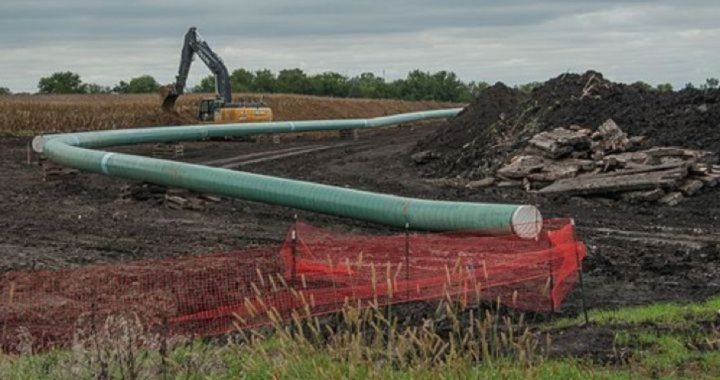
Jo-Ellen Darcy, the U.S. Army’s assistant secretary for civil works, announced on Sunday that it was pulling its previous approval to complete the Dakota Access pipeline: “The Department of the Army will not approve an easement that would allow the proposed Dakota Access Pipeline to cross under Lake Oahe in North Dakota.” Darcy, an Obama appointee with a degree in philosophy and sociology from Boston College, added: “Although we have had continuing discussion and exchanges of new information with the Standing Rock Sioux and Dakota Access, it’s clear that there’s more work to do.”
An estimated 5,000 protestors who are camped out near Cannon Ball, North Dakota, erupted into shouts and fist-pumps when the news broke. It included some 250 veterans affiliated with The Young Turks, a progressive/left-wing political commentary website that decided at the last minute to get involved. It claimed it was there to protect protestors from police actions that threatened to disperse the protestors from trespassing on private land.
Lake Oahe is close to Cannon Ball, North Dakota, which is 32 miles north of the Standing Rock Sioux Reservation. The pipeline is all but complete, needing only 1,100 feet of pipeline 90 to 160 feet beneath the Missouri River to allow it to begin transporting approximately 500,000 barrels a day of crude from the Bakken shale formation in northern North Dakota. The 1,200-mile long pipeline will deliver the oil to refineries in Illinois. Energy Transfer Partners (ETP) is the company behind the construction project. Meanwhile, oil from Bakken is being shipped by train, often within feet of waterways.
After months of discussions and planning, the Army Corps of Engineers granted approval for the project early last summer. On July 27, the Standing Rock Sioux, aided by the pro-bono environmentalist Earthjustice (formerly known as the Sierra Club Legal Defense Fund), sued the Corps in federal court, claiming that it didn’t do a sufficiently careful job of analyzing the project before issuing its initial approval. It claimed that the Corps should have consulted more extensively with the tribe and that the project as approved would violate newly discovered sacred burial sites.
On September 9, U.S. District Judge James Boasberg ruled against the tribe’s request to issue an injunction to stop construction of the pipeline while the issue was being considered. The tribe, said Boasberg, “has not shown it will suffer injury that would be prevented by any injunction the Court could issue,” adding that the Army Corps “gave the Tribe a reasonable and good-faith opportunity to identity sites of importance to it.”
Two days later the Obama administration took the unprecedented step of intervening in the case, ordering ETP stop construction. The administration added that the case involved far more than just a concern over oil spillage from the pipeline. It has “highlighted the need for a serious discussion on whether there should be nationwide reform with respect to considering tribes’ views on these types of infrastructure projects.”
Such a discussion would naturally delay construction of the Dakota Access pipeline for months if not years, thus accomplishing the goal the protestors were seeking: shutting down the project altogether.
On November 14, the Corps issued a news release asserting that, in fact, “additional discussion and analysis were warranted in light of the history of the Great Sioux Nation’s dispossession of lands, the importance of Lake Oahe to the Tribe, our government-to-government relationship, and the statute governing easements through government property.” This would virtually guarantee the end of the project, as the issues would take years to resolve.
The November decision was followed by Darcy’s announcement on Sunday.
The decision is politically driven, according to Brigham McCown, a former top pipeline administrator for the Transportation Department during the George W. Bush administration: “What it says is that even if you have your permits in hand, the government might change the rules on you once construction is almost done.”
As evidence that the issue remains far from settled is the fact that most of the protesters remain in place at Cannon Ball, North Dakota. Donald Trump’s inauguration could trigger a reversal either through an executive order or the new president ordering the secretary of the Army to reinstate the Corps’ previously approved permit.
A third option isn’t being considered seriously by ETP: reroute the pipeline someplace else. The company likely realizes that, after spending millions more to move the pipeline elsewhere, the protestors will just move their tents to the new location. It isn’t water issues or burial sites that are driving the opposition. It’s the protesters’ determination to shut the pipeline down entirely, all in the name of saving the Earth and keeping the oil in Bakken (and elsewhere) in the ground.
An Ivy League graduate and former investment advisor, Bob is a regular contributor to The New American magazine and blogs frequently at LightFromTheRight.com, primarily on economics and politics. He can be reached at [email protected].



